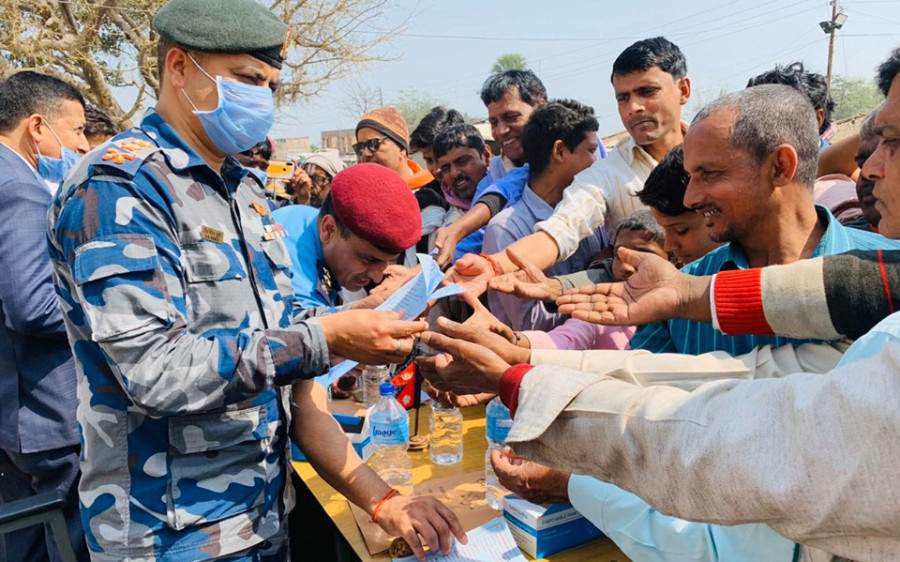The Nepal Police Headquarters on Wednesday issued a directive to every police station across the country to take necessary safety precautions against coronavirus.
The directive instructed all on-duty police personnel to wear face masks, avoid handshakes and wash hands frequently, among other dos and don’ts.
But many officers, particularly those working in crowded areas, are still executing their duties without basic safety gear like face masks and gloves.
When the Post inquired some on-duty police officers about the safety precautions, they said they had not received any protective gear from their respective stations.
Out of fear of contracting Covid-19 while on the job, they said they had bought face masks with their own money.
“Although we have received the directive to stay safe, we are yet to receive protective gear like masks, gloves and sanitiser,” said a police inspector who did not wish to be identified. “We are using disposable masks to stay safe, but our stock is quickly running out.”
Another officer working in the Kathmandu airport said they were getting face masks from the airport authority and airlines companies.
“We have been instructed not to maintain a safe distance with others and not to touch any person until and unless it’s urgent. To keep our safe we are wearing basic surgical masks and cloth masks provided by the airport and airlines. The Nepal Police has not provided us with any safety gear so far.”
Senior Superintendent of Police Ram Tripal Shah, however, claimed that Nepal Police has been providing masks and gloves to every police stations and beat offices.
“We have ordered additional face masks and gloves so that we do not run out stock,” Shah told the Post. He insisted that the directive from the headquarters was being followed strictly.
Superintendent of Police Jeevan Kumar Shrestha at the Metropolitan Traffic Police Division also claimed that the traffic officers on the streets of Kathmandu had enough protective gear to remain safe.
“We have provided surgical masks, gloves and sunglasses to our officers,” Shrestha said. “We have even instructed our officers not to carry out drink driving tests as it could be dangerous for them.”
Deputy Inspector General of Police Biswaraj Pokharel, chief of the Metropolitan Police Office, Ranipokhari, said the Nepal Police was making preparations to distribute necessary safety gear to those officers who did not have them.
“Although we have already issued the safety directive to our officers, we are yet to distribute protective gear,” Pokharel told the Post. “In the first phase, we are planning to distribute face masks. We will distribute other items like sanitisers later on.”
Frequently asked questions about the coronavirus outbreak
UPDATED as of September 22, 2020
What is Covid-19?
Covid-19, short for coronavirus disease, is an illness caused by the coronavirus SARS-CoV-2, short for severe acute respiratory syndrome coronavirus 2. Common symptoms of the disease include fever, dry cough, fatigue, shortness of breath and breathing difficulties. In severe cases, the infection can cause pneumonia, severe acute respiratory syndrome, kidney failure and even death.
How contagious is Covid-19?
Covid-19 can spread easily from person to person, especially in enclosed spaces. The virus can travel through the air in respiratory droplets produced when a sick person breathes, talks, coughs or sneezes. As the virus can also survive on plastic and steel surfaces for up to 72 hours and on cardboard for up to 24 hours, any contact with such surfaces can also spread the virus. Symptoms take between two to 14 days to appear, during which time the carrier is believed to be contagious.
Where did the virus come from?
The virus was first identified in Wuhan, China in late December. The coronavirus is a large family of viruses that is responsible for everything from the common cold to Middle East Respiratory Syndrome (MERS) and Severe Acute Respiratory Syndrome (SARS). After an initial outbreak in Wuhan that spread across Hubei province, eventually infecting over 80,000 and killing more than 3,000, new infection rates in mainland China have dropped. However, the disease has since spread across the world at an alarming rate.
What is the current status of Covid-19?
The World Health Organisation has called the ongoing outbreak a “pandemic” and urged countries across the world to take precautionary measures. Covid-19 has spread to 213 countries and territories around the world and infected more than 31,405,983 people with 967,505 deaths and 22,990,260 recoveries. In South Asia, India has reported the highest number of infections at 5,557,573 with 88,943 deaths. While Pakistan has reported 306,304 confirmed cases with 6,420 deaths. Nepal has so far reported 65,276 cases with 427 deaths.
How dangerous is the disease?
The mortality rate for Covid-19 is estimated to be 3.6 percent, but new studies have put the rate slightly higher at 5.7 percent. Although Covid-19 is not too dangerous to young healthy people, older individuals and those with immune-compromised systems are at greater risk of death. People with chronic medical conditions like heart disease, diabetes and lung disease, or those who’ve recently undergone serious medical procedures, are also at risk.
How do I keep myself safe?
The WHO advises that the most important thing you can do is wash your hands frequently with soap and water for at least 20 seconds or use hand sanitizers with at least 60 percent alcohol content. Avoid touching your eyes, nose and mouth with unclean hands. Clean and disinfect frequently used surfaces like your computers and phones. Avoid large crowds of people. Seek medical attention if symptoms persist for longer than a few days.
Is it time to panic?
No. The government has imposed a lockdown to limit the spread of the virus. There is no need to begin stockpiling food, cooking gas or hand sanitizers. However, it is always prudent to take sensible precautions like the ones identified above.





 20.12°C Kathmandu
20.12°C Kathmandu














